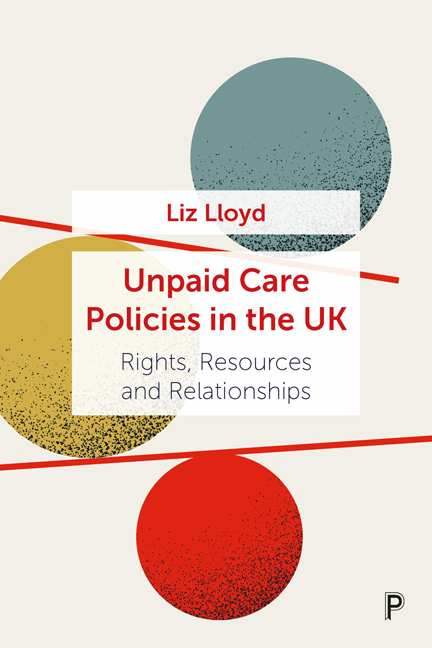Book contents
- Frontmatter
- Contents
- About the author
- Preface
- 1 Introduction and background to unpaid care in the UK
- 2 Research and knowledge development on unpaid care in the UK
- 3 Policies to support unpaid carers
- 4 Policies into practice
- 5 Analysis of policies in context
- 6 The political and ethical dimensions of care
- 7 Conclusions
- References
- Index
1 - Introduction and background to unpaid care in the UK
Published online by Cambridge University Press: 20 January 2024
- Frontmatter
- Contents
- About the author
- Preface
- 1 Introduction and background to unpaid care in the UK
- 2 Research and knowledge development on unpaid care in the UK
- 3 Policies to support unpaid carers
- 4 Policies into practice
- 5 Analysis of policies in context
- 6 The political and ethical dimensions of care
- 7 Conclusions
- References
- Index
Summary
Introduction
On 4 March 2021, a day after the budget statement in the House of Commons, a discussion took place on the BBC's World at One programme. Carers, service users, politicians and professionals had reacted with disappointment and anger that despite unprecedented levels of pressure and financial hardship experienced by families and care workers throughout the COVID-19 pandemic there had been no mention of social care in the budget statement. Interviewed by Sarah Montague, Sir Andrew Dilnot, who had chaired the Commission on Funding of Care and Support in 2011 (Dilnot 2011), referred to the sorry state of social care in the UK as a ‘stain on our nation’. He argued that funding for social care is affordable, despite the many calls on the nation's finances, but that ‘courage and strength of will’ were needed to develop a policy on social care. ‘Why courage?’ asked Sarah Montague. He replied, ‘Because, for reasons that I don't fully understand, elderly people and working aged people and children needing this kind of care are not a subject we find it easy or comfortable to speak about’. And because social care is a subject that politicians would prefer to avoid, said Dilnot, ‘we have allowed it to be in the margins, in the shadows of our society and our economic and social policy and that does us no credit’.
This exchange draws attention to the scope of debates on care policies, to the social, cultural and philosophical issues involved in caring. It provides valuable context for an analysis of policies on unpaid care. Indeed, it suggests that unpaid care is in a particularly perilous situation because with social care policies confined to the margins, unable to attract political attention or economic resources, pressures on unpaid carers will continue unabated. Policies are shaped by economic and political priorities and reflect dominant cultural values. Policies exist in decisions and actions as well as in the absence of these and the lack of attention to social care in the 2021 budget should be understood, therefore, as a purposeful policy decision, not an accidental oversight.
- Type
- Chapter
- Information
- Unpaid Care Policies in the UKRights, Resources and Relationships, pp. 1 - 14Publisher: Bristol University PressPrint publication year: 2023



